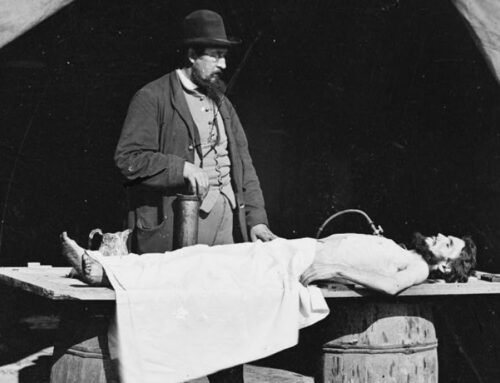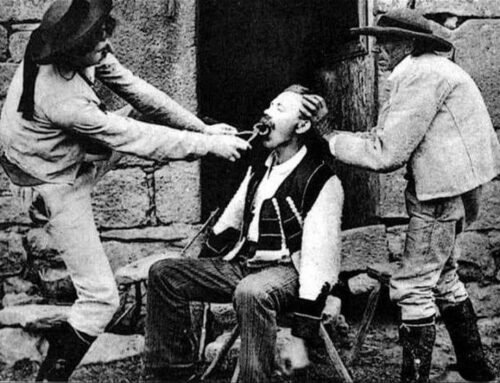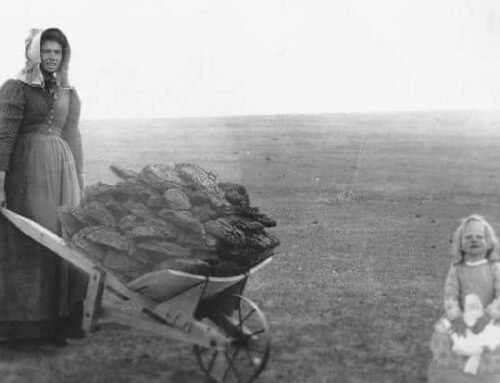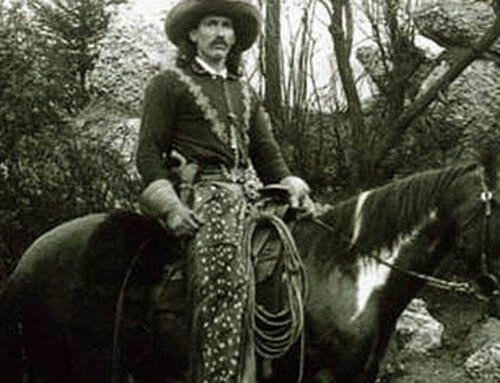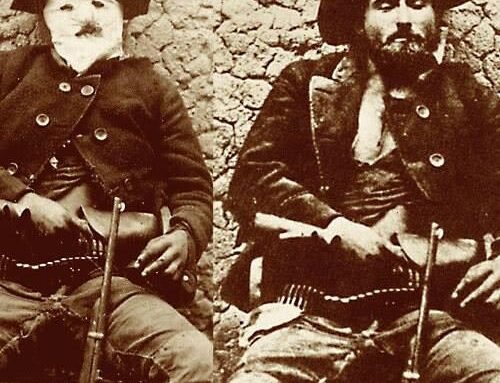Deadwood, South Dakota
By western author Nick Brumby
 “Praise the Lord and place your bets. I’ll take your money with no regrets.” ‘Poker Alice’, Deadwood gambling madame
“Praise the Lord and place your bets. I’ll take your money with no regrets.” ‘Poker Alice’, Deadwood gambling madame
The city of Deadwood, South Dakota, grew from the promise of wealth.
The discovery of gold in the southern Black Hills in 1874 set off one of the greatest gold rushes in American history. In 1876, miners moved into the northern Black Hills. That’s where they came across a gulch full of dead trees and a creek full of gold. ‘Deadwood’ was born.
Between 1874 and 1877, some 20,000 prospectors made the trek to Deadwood Gulch. Practically overnight, the tiny gold camp boomed into a town that played by its own rules that attracted outlaws, gamblers and gunslingers along with the gold seekers. By July of 1876, a million dollars of gold at $20 an ounce had been taken from the Black Hills.
 Deadwood didn’t have an organized government until October 1876. In its earliest days Deadwood was little more than a rough-and-tumble mining camp, where men, livestock and the elements coexisted, in a sprawl of ramshackle buildings and tents, knee-deep in mud, rats and garbage.
Deadwood didn’t have an organized government until October 1876. In its earliest days Deadwood was little more than a rough-and-tumble mining camp, where men, livestock and the elements coexisted, in a sprawl of ramshackle buildings and tents, knee-deep in mud, rats and garbage.
A mostly male population eagerly patronized the many saloons, gambling establishments, dance halls, and brothel, which were considered legitimate businesses and were well known throughout the area. Ninety percent of the female population of Deadwood were ‘soiled doves’.
Because the town was located illegally on Indian land, no government or law existed to keep trouble in check. Most of the town’s residents frequented the saloons and brothels that sprang up on nearly every street, occupying their time with drinking, gambling and fighting. Violence was common, lending credence to the oft-repeated observation that Deadwood hosted a murder a day.
 Wild Bill Hickok was one of those men who came looking for fortune but found a violent end. Just a few short weeks after arriving, he was gunned down while holding a poker hand of aces and eights – forever after known as the Dead Man’s Hand. (Calamity Jane later claimed she was so upset by Hickok’s murder that she went after his killer with a meat cleaver, having left her guns at her residence.)
Wild Bill Hickok was one of those men who came looking for fortune but found a violent end. Just a few short weeks after arriving, he was gunned down while holding a poker hand of aces and eights – forever after known as the Dead Man’s Hand. (Calamity Jane later claimed she was so upset by Hickok’s murder that she went after his killer with a meat cleaver, having left her guns at her residence.)
Other legends, like Potato Creek Johnny, Seth Bullock and Al Swearengen, also created their legends and legacies in this Black Hills town.
Bullock, who served as sheriff into 1878 and then continued to uphold the law as a deputy U.S. marshal for a time, had little tolerance for disruption of the public peace, and once crushed a mining strike by dumping canisters of sulfurous gas into the Keets Mine, where the boycotting miners were entrenched. Not a single shot was fired as the humbled miners emerged from the mining shaft, choking and bleary-eyed.
From 1876 until the 1980s, prostitution was Deadwood’s “not so little secret”. The first of the working girls, along with infamous Madams ‘Mustache’ and ‘Dirty Em’, arrived in Deadwood via the same wagon train that carried Wild Bill Hickok and Calamity Jane. Miners were so happy to see the prostitutes roll into town that they lined the streets and clapped as the wagon passed by.
After that, prospecting and prostitution went hand and hand in Deadwood. In fact, an entire city block was occupied by nothing but brothels.
 Deadwood’s community of Chinese immigrants lived on a section of Main Street called the Badlands, and many had moved from China to the U.S. in hopes of striking it rich. But when they got there, most weren’t allowed to stake mining claims.
Deadwood’s community of Chinese immigrants lived on a section of Main Street called the Badlands, and many had moved from China to the U.S. in hopes of striking it rich. But when they got there, most weren’t allowed to stake mining claims.
Deadwood ended up having a large Chinese population of at least 110 people, according to 1880 census records, and about half of Lawrence County’s Chinese were in the laundry business. Why laundries? Because they could save the wash water, sluice it, and get gold dust from the miner’s clothes.
Most of Deadwood’s restaurants were also Chinese-owned, and the town continued to embrace its Chinese residents, especially a group that organized into a firefighting force and was dubbed “the fastest Chinese hose team in the world.”
Deadwood has survived three major fires and numerous economic hardships, pushing it to the verge of becoming another Old West ghost town. However, unlike other popular mining camps, Deadwood never died when the gold played out.
Today, it thrives as the County seat and holds an eternal place amongst the legends of the Old West.

About Nick Brumby
I like a good story. And of all stories, I love westerns the most.
As a kid, I spent far too many afternoons re-watching Clint Eastwood spaghetti westerns, picking up ‘Shane’ for just one more read, or saddling up beside Ben Cartwright when ‘Bonanza’ was on TV each afternoon.
I’m a former journalist and I love horses, dogs, and the occasional bourbon whiskey. I live with my wife, daughter and our ever-slumbering hound in a 1800’s-era gold mining town – our house is right on top of the last working gold mine in the area. There may not be much gold left, but there’s history wherever you look.
I hope you enjoy my westerns as much as I enjoyed writing them!
Happy trails,
Nick























